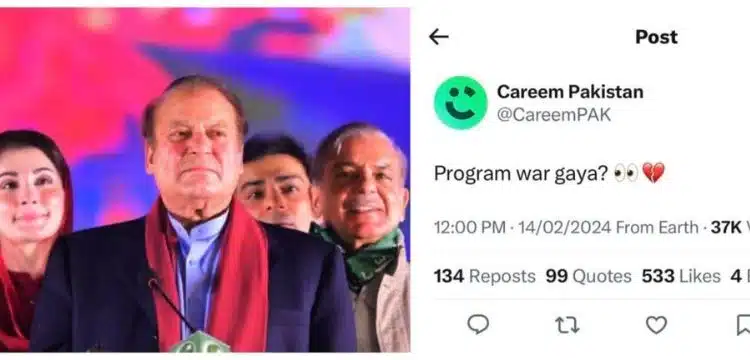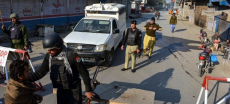[vc_row][vc_column][vc_column_text dp_text_size=”size-4″]The Pakistan Muslim League-Nawaz (PML-N), asserting itself as the largest political party post the 2024 general elections, found itself in a confrontation with the ride-sharing company Careem due to a cryptic social media post. The Election Commission of Pakistan’s provisional results indicated that independent candidates, largely supported by the Pakistan Tehreek-e-Insaf (PTI), secured a lead in the National Assembly with 101 seats, followed by PML-N with 75 seats and the Pakistan Peoples Party (PPP) with 54 seats.
The PML-N, seemingly caught off guard by these results, anticipated a majority to independently form the government in both the Centre and Punjab. The outcome has left the formation of governments at various levels in uncertainty, as both PML-N and PTI vie for control.
Read more: Careem Celebrates One-Year Milestone with Launch of Flexi Ride
In the midst of this political flux, Careem stirred controversy by sharing a cryptic and humorous post on Twitter. The post featured the well-known line of PTI leader Sher Afzal Marwat, “Program to war gaya” (Game is over), alluding to the prevailing political uncertainty in the country. However, this post did not sit well with the PML-N, which promptly called for a boycott of Careem, labeling its action as “shameful.”
Expressing its discontent, PML-N asserted that this was not the first instance of such behavior from Careem and accused the ride-sharing company of revealing its political biases. The party criticized Careem for prioritizing political agendas over its primary role and deemed the act as shameful.
The controversy highlights the sensitivity and polarization of political sentiments in Pakistan, where even a seemingly innocuous social media post by a private company can trigger a heated response. The PML-N’s call for a boycott reflects not only its displeasure with Careem’s perceived alignment with a political stance but also underscores the larger challenges in navigating the complex and evolving political landscape of the country.
The aftermath of the general elections has created a tense political environment, with the PML-N and PTI engaged in a struggle for the reins of power. The competition for the formation of governments at various levels amplifies the stakes, contributing to an atmosphere where even a seemingly neutral entity like a ride-sharing company can become entangled in political controversies.
As Careem faces backlash from the PML-N, the incident raises questions about the role of private companies in the political discourse of the country. It underscores the need for businesses, especially those with a significant public presence, to tread cautiously in the politically charged environment and avoid actions that could be interpreted as favoring one political group over another.
In conclusion, the clash between PML-N and Careem over a social media post adds a new dimension to the post-election scenario in Pakistan. It highlights the intricacies of the political landscape, where even private entities can become inadvertent participants in the larger political narrative. The incident prompts a reflection on the delicate balance businesses must maintain to navigate the complex political dynamics in a country undergoing significant political transformations.[/vc_column_text][/vc_column][/vc_row]











